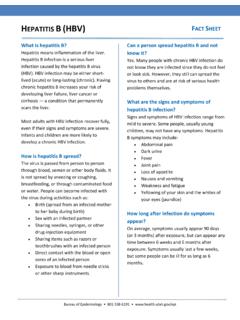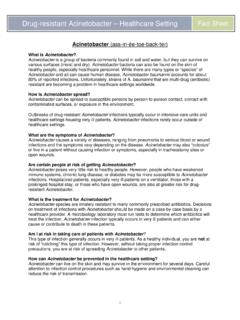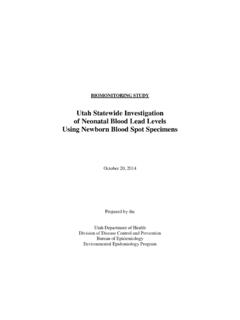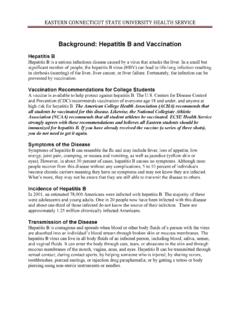Transcription of HEPATITIS C VIRUS (HCV) - Utah Department of Health
1 HEPATITIS C VIRUS (HCV) FACT SHEET. What is HEPATITIS C VIRUS ? HEPATITIS C is an infection of the liver that Fatigue results from the HEPATITIS C VIRUS (HCV). HCV Nausea or poor appetite is one of the most common types of viral Stomach pain HEPATITIS in the United States. Others include Dark-colored urine HEPATITIS A and HEPATITIS B. Yellow discoloration in the skin and eyes (jaundice). How is HEPATITIS C VIRUS spread? Fever HCV is spread when blood from a person Muscle and joint pains infected with HCV enters the body of someone who is not infected.
2 Most people How long after infection do symptoms become infected with HCV by sharing needles appear? or other equipment to inject drugs, receiving Symptoms usually don't occur until late in the donated blood, blood products and organs course of chronic (long-term illness) infection. In before 1992 and needle stick injuries in those persons who do develop symptoms, the healthcare settings. People have also become average time is 6-7 weeks after exposure, but infected with HCV from body piercing or this can range from 2 weeks to 6 months. tattoos received in prisons, homes, or in other unlicensed or informal facilities.
3 In rare Who is most at risk? cases, HCV may be sexually transmitted. HCV testing is recommended for anyone at Babies born to mothers with HCV can get increased risk for HCV infection, including: infected during childbirth. Persons born from 1945 through 1965. HCV is NOT spread by casual contact, Persons who have ever injected illegal including sharing eating utensils, drugs, including those who injected only breastfeeding, hugging, kissing, holding once many years ago and shared any drug hands, coughing, or sneezing. It is also not injection equipment spread through food or water.
4 Recipients of donated blood, blood products and organs before 1992. What are the signs and symptoms of People who received a blood product for HEPATITIS C VIRUS infection? clotting problems made before 1987. Approximately 70% 80% of people with Hemodialysis patients or persons who acute (short-term illness) HCV infection do spent many years on dialysis for kidney not have any symptoms. About one to three failure months after exposure, the following signs and symptoms occur in a small proportion of infected people: Bureau of Epidemiology 801-538-6191 People who received body piercing or a person will first get a screening test that will tattoos done with non-sterile show whether he or she has developed instruments or by a non-licensed antibodies to HCV.
5 (An antibody is a substance facility found in the blood that the body produces in People with known exposures to HCV, response to a VIRUS .) Having a positive antibody such as: test means that a person was exposed to the o Healthcare workers injured by VIRUS at some time during his or her life. If the needle sticks antibody test is positive, your healthcare o Recipients of blood or organs provider will most likely order a second test to from a donor who tested confirm whether the VIRUS is still present in your positive for HCV bloodstream. HIV-infected persons Children born to mothers infected How is HEPATITIS C VIRUS infection treated?
6 With HCV HCV is treatable. There are several anti-viral medications that are available to treat HCV. What type of Health problems are Success of treatment depends on many factors, caused by HEPATITIS C VIRUS infection? including the classification of HCV, previous Unless successfully treated with medication, treatment, cirrhosis and other infections. chronic HCV infection can cause other serious Health problems, such as cirrhosis, liver If a person is successfully treated and has no cancer and liver failure. A small percentage of detectable VIRUS in the blood for more than 6.
7 Persons with chronic HCV infection develop months, the person is considered cured and is medical conditions due to HCV that are not no longer infectious to others. limited to the liver. Such conditions can include Diabetes mellitus, which occurs three How can HEPATITIS C VIRUS infection be times more frequently in HCV-infected prevented? persons, kidney disease, Non-Hodgkins There is no vaccine to prevent HCV infection. You lymphoma, which might occur somewhat can reduce your risk of becoming infected by more frequently in HCV-infected persons.
8 Doing the following: How is HEPATITIS C VIRUS infection If you're injecting drugs, try to get into a diagnosed? treatment program. If you continue to use Several different blood tests are used to test drugs, don't share needles or other for HCV. Your healthcare provider may order equipment with anyone else. one or a combination of these tests. Typically, Bureau of Epidemiology 801-538-6191 Make sure all equipment has been Where can I get more information? sterilized if you're getting body Your personal healthcare provider piercings or a tattoo and go to a American Liver Foundation licensed professional.
9 Centers for Disease Control and If you're a healthcare worker, follow Prevention your institution's safety precautions. For example, wear protective clothing and gloves and dispose of contaminated sharp objects properly. If you have more than one sex partner or are a man having sex with other men, use condoms for sexual intercourse. Rev. 09/2015. Bureau of Epidemiology 801-538-6191













